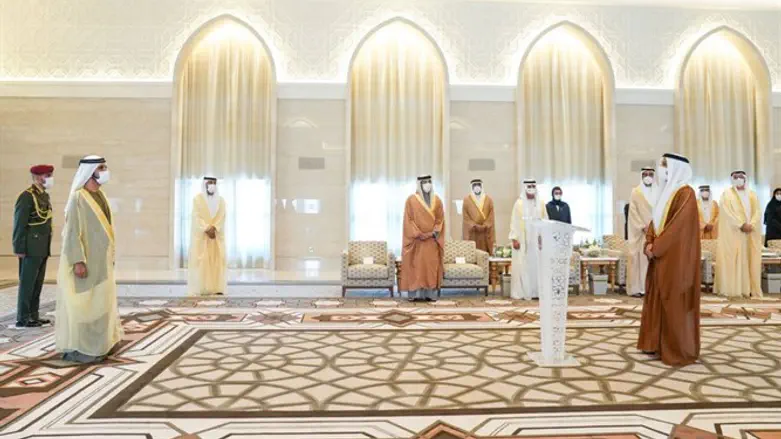
The recent visit of Israeli Foreign Minister Yair Lapid to the UAE is a qualitative leap in the process of establishing real official relations between the two countries.
This visit saw the opening of the Israeli embassy in Abu Dhabi and a consulate in Dubai.
The first UAE ambassador was received in Israel.
It all has many important implications.
Most not least, it emphasizes the “institutional” relationship between the UAE and Israel. Allegations by some that these relations declined following the change in the Israeli government and former Prime Minister Benjamin Netanyahu’s move to the opposition seats have been refuted.
The decision to normalize relations was not about one person, but about a country with which the UAE’s strategic interests converge. So this decision was not about photo ops of former and current governments and registering political positions.
It is based on a clear strategic vision of both countries to promote cooperation and achieve common interests regardless of who is in power in Israel. Leaders and governments change according to the will and choices of the Israeli voter. Therefore, these are agreements with states, not with specific individuals or parties.
Most of the media reports I saw on the visit describe it as “historic. ”This visit signals an important symbolic qualitative shift in Israel’s relations with the Arab world. M. Lapid is the first Israeli foreign minister to visit the UAE."
The timing factor made the visit exceptionally important; it follows the recent outbreak of violence in Gaza between Israel and the Palestinian Arabs. Some observers said the events were a tough test for the normalization of relations agreement signed several months ago between the UAE and Israel.
Others, that they represented a “death warrant” for that normalization, without providing convincing rational justifications for their predictions. The visit came to prove that both sides, the UAE and Israel, are thinking about bilateral relations on a long-term strategic level. They do not want to fall into the trap of political waivers or let sloganeers interfere with their common interests.
Nor do they want to submit to the propagandistic pressures exerted by some parties that feed on chronic regional chaos as the appropriate climate to achieve their plans without considering the societies’ need for security, stability and peace.
Since the announcement of the establishment of relations with Israel, the UAE has insisted that there is no conflict between these relations and its position in support of the legitimate rights of the Palestinian Arabs. Normalization from the outset was not an ephemeral slogan subject to the political and security atmosphere in our region. It is about bilateral cooperation agreements in different fields.
Partnerships, agreements and economic, scientific, commercial and tourist arrangements that cannot be held hostage by other issues. This is the characteristic of stable and permanent international relations.
The occasional tensions between some regional states have not prevented the continuity of trade relations and the implementation of cooperation agreements signed between them. All the more so since the agreement establishing relations between the UAE and Israel was signed in a climate of regional tensions and was criticized by some parties.
All this strengthens these relations and protects them from the effects of tensions. The UAE, for its part, does not look at any issue from a narrow perspective. It is a state with an exceptional ability to build comprehensive and broad visions of any regional issue.
Without these capabilities, the UAE would not have assumed the regional and international strategic position to which it has risen. The same is true for relations with Israel. They are not limited to times of violence and tension.
They are subject to a long-term strategic assessment. An assessment that takes into account all the variables related to this vital issue, on a regional and international scale. From then on, one can understand the UAE’s approach to this relationship.
What is most striking about the Israeli minister’s visit to the UAE is that Palestinian President Mahmoud Abbas said that “normalization agreements will not succeed and will not bring peace to the region.” Perhaps he is not following the reality of things and how well they are unfolding on the ground.
The UAE has never said that an agreement to establish relations with Israel would bring peace to the Middle East. It is simply not in the hands of the UAE. The keys to the solution are in the hands of its own protagonists. The party with the cause. It is the Palestinian Arabs, whose legitimate rights the UAE has always affirmed. Its role is limited to seeking a political settlement, creating the means to achieve it, and encouraging both sides to engage in it.
As for the question of the success or failure of these agreements, the numbers say that the UAE and Israel have signed the 12th agreement between them since the announcement of the establishment of relations. Confirmation that things are going as planned for both countries.
The Palestinian Authority leadership would do better to find innovative alternatives to break the stalemate and find solutions that meet the aspirations of Palestinian Arabs to live in security and peace, rather than continuing tensions and conflicts.
Dr. Salem AlKetbi is a UAE political analyst and former Federal National Council candidate
